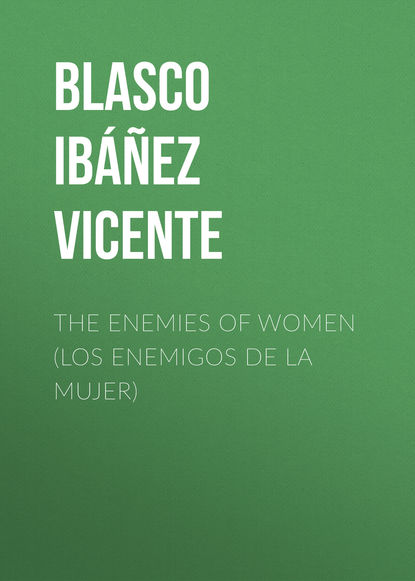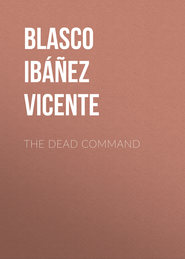По всем вопросам обращайтесь на: info@litportal.ru
(©) 2003-2024.
✖
The Enemies of Women (Los enemigos de la mujer)
Настройки чтения
Размер шрифта
Высота строк
Поля
"I shall refuse to receive her," affirmed the Prince.
And doubtless in order not to talk any more about the Duchess de Delille, he suddenly left his friends, and walked out of the room.
Atilio, in a conversational mood, turned and asked a question of Don Marcos, who was speaking with Novoa, while Spadoni went on dreaming, with eyes wide open, of the English lord's system.
"Have you seen Doña Enriqueta lately?"
"Are you asking me about the Infanta?" replied the Colonel gravely. "Yes, I met her yesterday, in the courtyards of the Casino. Poor lady! If it isn't a shame! The daughter of a king… She told me that her sons haven't anything to wear. She owes two hundred francs for cigarettes, at the bar of the private play rooms. She can't find anyone who will lend her money. Besides, she has frightful bad luck; she loses everything. These are fatal days for people of royal blood. I almost wept when I heard all her poverty and troubles, and felt that I couldn't give her anything more. The daughter of a king?"
"But her father disowned her, when she eloped with some unknown artist," said Atilio. "And besides, Don Carlos wasn't a king anywhere."
"Señor de Castro," replied the Colonel, drawing himself up, like a rooster, "let's not spoil the party. You know my ideas: I have shed my blood in the cause of Legitimacy, and the respect that I have for you should not…"
Novoa, wishing to calm Don Marcos, intervened in the conversation.
"Monte Carlo here is like a beach, where all sorts of wreckage, living and dead, is washed up sooner or later. In the Hôtel de Paris there is another member of the family, but of the successful branch, the one that is ruling and taking in the money."
"I know him," said Atilio, laughing. "He's a young man of calipigous exuberance and wherever he goes his handsome gentleman secretary goes with him. He always meets some venerable old lady who, dazzled by his royal kinship, takes it upon herself to keep up his extravagant mode of living… Don't know what the devil he can possibly give her in return! As for the secretary, he gives him a slap from time to time just to assert his ancient rights."
Don Marcos remained silent. He was not interested in the members of that branch, not he.
"Also," Castro continued mischievously, "in the Casino before the war, I met Don Jaime, your own king at present. A great fellow for gambling! He risked thousand franc chips by the handful. He had a lot of money coming from somewhere. In the Casino they all used to say that it was sent him from Madrid, on condition that he should have no children and allow his claims to the throne to die out with him."
"And just to think," murmured Novoa, without realizing that he was speaking aloud, "that for both of these families, back there, so many men have killed one another. To think, that for a question of inheritance among people like that we have gone back a century in European life!"
"You too!" exclaimed the Colonel, provoked again. "A scholar, saying a thing like that! I can hardly believe my ears!"
CHAPTER II
AT the end of the second Carlist war a Spanish officer, Don Miguel Saldaña, had found himself, as a result of the defeat, banished forever from his own country and condemned to a life of poverty and obscurity. The Madrid papers, without prefixing his name with any slanderous adjectives, called him simply "the rebel chief Saldaña." This courtesy, doubtless, was intended to distinguish him from the other party chiefs who in Aragon, Catalonia, and Valencia, had waged a campaign of pillage and executions for five years. Among his own people he was known as General Miguel Saldaña, Marquis of Villablanca. The pretender, Don Carlos, had given him that title because Villablanca was the name of the town where Saldaña had practically annihilated a column of the Liberal army. The topographical information of Saldaña's Chief of Staff – a local priest who had spent his whole life in doing nothing except saying mass on Sundays and spending the rest of the week hunting in the mountains with his dog and gun – gave him an opportunity to take the enemy by surprise, and he won a notorious victory.
When he crossed the frontier as a fugitive, through refusing to recognize the Bourbons as the constitutional rulers, "the rebel chief Saldaña" was twenty-nine years of age. A second son in a proud and ruined family, he had been obliged to resist the traditions of his house which presented for him an ecclesiastical career. When his studies at the Military School at Toledo were just finishing, the Revolution of 1868 caused him to renounce a commission to escape being under orders from certain generals who had participated in overthrowing royalty. When Don Carlos took up arms, Saldaña was one of the first to volunteer his services; and having gone through a military school, and received a good education, he at once became conspicuous among the guerrillas of the so-called Army of the Center, made up, for the most part, of country squires, village clerks, and mountain priests.
Besides, Saldaña distinguished himself for a reckless though rather unfortunate bravery. He always led the attack at the head of his men and consequently was wounded in the majority of his fights. But his wounds were "lucky wounds" as the soldiers say. They left marks of glory on his body without destroying his vigorous health.
Finding himself alone in Paris, where his only resource was the admiration of a few elderly "legitimist" ladies of the aristocratic Faubourg Saint Germain, he left for Vienna. There his king had friends and relatives. His youth and his exploits gained him admission as a hero of the old monarchy to the circle of archdukes. The war between Russia and Turkey tore him away from his pleasant life as an interesting hanger-on. Being a fighting man and a Catholic, he felt it his duty to wage war against the Turks; and with recommendations as a protégé of some influential Austrians, he went to the Court at Saint Petersburg. General Saldaña became a mere Commander of a Squadron in the Russian Cavalry. The officers conversed with him in French. His horsemen understood him well enough when he placed himself in front of his division, and, unsheathing his sword, galloped ahead of them against the enemy.
Various successful charges and two more "lucky wounds" won him a certain celebrity. At the end of the war he had gained numerous friends among officers of the nobility, and was presented in the most aristocratic drawing rooms. One evening at a ball given by a Grand Duchess, he saw close at hand the most fashionable and most talked of young woman of the season: the Princess Lubimoff.
She was twenty-two, an orphan, with a fortune said to be one of the largest in Russia. The first to bear the title of Prince Lubimoff, a poor but handsome Cossack, unable to read or write, succeeded in winning the attention of the Great Catherine, who made him the favorite among her lovers of second rank. During the years that her imperial caprice lasted, the new Prince was forced to seek his fortune far from the Court, since the favorites before him had gained possession of all that was near at hand. The Czarina allowed him to make his selection on the map of her immense Empire; distant territories beyond the Urals, which the new proprietor was, like the majority of his successors, never to see. With the introduction of the railroad, enormous riches came to light in these lands chosen by the Cossack; in some, veins of platinum were discovered; in others, quarries of malachite, deposits of lapis lazuli, and rich oil wells. Besides, tens of thousands of serfs, recently freed by the Czar, continued to work the land for the Lubimoff heirs, just as they had before the emancipation. And all this immense fortune, which nearly doubled each year with new discoveries, belonged entirely to one woman, the young Princess, who considered herself as one of the Imperial family owing to the relationship of her ancestor, and had more than once given the sovereign cause for worry through the eccentricities of her character.
She was an aggressive young woman, capricious and inconsistent in both words and deeds, a puzzle to everyone through the sharp contradictions in her conduct. She mingled with the officers of the Guard, treating them as comrades, smoking and drinking with them and taking a hand in their exercises in horsemanship; and then suddenly she would shut herself up in her palace for whole weeks, on her knees most of the time, before the holy ikons, absorbed in mystic fervor, and loudly imploring the forgiveness of her sins. She looked on the Emperor with veneration, as the representative of God. At the same time she was known to sympathize with the Nihilists.
The courtiers were scandalized whenever they told how she had accompanied a girl, whom the police were watching to a wretched house on the outskirts of the capital, and had there mingled with the revolutionary rabble composed of workmen and students. With them she had entered a narrow room, and joined the line passing before a coffin that was constantly in danger of being upset by the pushing of the gloomy curious crowd. The dead man's name was Fedor Dostoiewsky. The princess had scattered a bouquet of the most costly roses on the protruding forehead and monkish beard of the novelist.
And in her moments of anger this same Nadina Lubimoff beat the servants in her Palace, as though they were still serfs, and forced her maids to grovel at her feet. Her irritability and fiery temper turned everything upside down, to such an extent that a certain elderly Prince, who by Imperial order had been chosen as her guardian, desired, in spite of the fact that it would mean to him loss of the management of an immense fortune, to see her married as soon as possible.
Nadina Lubimoff inspired a feeling of dread in her suitors. They were all afraid that she would answer their request for her hand with a cruel jest. Twice she had announced her engagement to gentlemen of the Court, and at the last moment she herself had begged the Czar to refuse his consent. By this time no one dared propose, for fear of laughter and comment. Yet in spite of the freedom and unconventionality of her conduct, no one doubted the uprightness of her character.
On seeing her, Saldaña thought of a naiad of the North, rising from an emerald river, in which cakes of ice were floating. She was tall and majestic, with a somewhat massive figure, like the divinities painted in frescos for ceilings. Her skin was of radiant whiteness. The pupils of her gray eyes gave out a greenish light, and her silky hair was a faded washed-out red. Owing to the marvelous whiteness of her complexion, her flesh appeared somewhat soft, but a fresh fragrance emanated from it, "the fragrance of running brooks," to use the words of her admirers. Her nostrils were rather wide, and in the stress of emotion they quivered, like those of a horse, thus recalling her glorious ancestor, the virile Cossack of the Czarina.
The ball was nearly over before she noticed the Spaniard. There were so many officers constantly at her heels, greeting her cruel jokes and vulgar expressions with a smile of gratitude! – Suddenly Saldaña, who was standing between two doorways, was startled by a clear but commanding female voice.
"Your arm, Marquis."
And before he could offer it to her the young Princess took it, and led him off to the buffet in the drawing room.
Nadina drank a good sized glass of vodka, preferring this liquor of the people to the champagne which the servants were pouring out in large quantities. Then smiling at her companion she drew him into the embrasure of a window where they were almost hidden by the curtains.
"Your wounds!.. I want to see your wounds!"
Saldaña was dumfounded at the command of this great lady accustomed to carrying out her most whimsical ideas. Blushing like a soldier, who had lived all his life among men, he finally drew up the left sleeve of his uniform, revealing a brown, hairy forearm, with large tendons, and deeply furrowed by the scar of a bullet wound received back in Spain.
The Princess admired his athletic arm, with its dark skin, cut by the jagged white of the new tissue.
"The other – the others! I want to see the rest of them!" she commanded, gazing at him fiercely, as though she were ready to bite, while her lips, moist and shining, curved sharply downward.
She had seized his arm with a hand that trembled, while with the other she tried to undo the gold cords on the officer's breast.
Saldaña drew back, stammering. "Oh! Princess!" What she desired was impossible. It was impossible to show the other wounds to a lady…
He felt on the one visible scar the contact of two lips. Nadina, bowing her proud head, was kissing his arm.
"Hero!.. Oh! my hero!"
Immediately afterward she drew herself up again, cold and distant, with no other sign of emotion than a slight quivering of her nostrils. No longer was she tormented by the desire to see immediately those frightful scars of which she had heard from some of the comrades of the brave adventurer. She was sure of being able to see them to her heart's content whenever she pleased.
In a few days the rumor began to circulate that the Princess Lubimoff was to be married to the Spaniard. She herself had started the news going, without bothering to ascertain beforehand the inclination of her future husband.
The arguments with which she justified her decision could not have been more weighty. She was blond and Saldaña was dark. They had both been born at outermost limits of Europe. These considerations were sufficient to make a happy marriage. Besides, the Princess was convinced that she had always been fond of Spain, although she would not have been able to place it accurately on the map. She recalled certain verses of Heine mentioning Toledo, and others by Musset addressing Andalusian Marquises of Barcelona; and she used to hum a love song about the oranges of Seville… Her hero must surely be from Toledo, or, better yet, an Andalusian from Barcelona.
In vain certain people of the court spoke of the Czar's not allowing the match. A great heiress marrying a foreign soldier banished from his country!.. But the Princess by her very conduct, gave the sovereign to understand her will.
"Either I marry him, or I start out as a dancer in a Paris theater."
It was rumored that Saldaña was about to be deported.
"So much the better: I will go and join him, and be his sweetheart."
The old Prince, her guardian, lamented this obstinacy on the part of the Court. If it had not been for this opposition, Nadina's caprice for Saldaña, like so many of her whims, would have lasted only a few days. It was said that perhaps the Emperor, in order to break her will, would dispossess her of her vast estates in Siberia. The grandchild of the Cossack shrieked in reply that she would kill herself rather than obey.
At last the ruler prudently allowed her to fulfil her desire. In getting married she would give up her eccentricities perhaps, and the Russian court, so rich in scandals, would have one less.
The wedding journey of the Princess Lubimoff lasted all her life. Only twice, for reasons relating to her great fortune, did she return to Russia. Western Europe was more favorable than the court of an autocrat to her love of freedom. In the first year of her marriage, while in London, she had a son, who was to be the only child. She allowed him to be called Michael, like his father, but insisted that he should have a second name, Fedor, perhaps in memory of Dostoiewsky, her favorite novelist, whose character inspired in her a feeling of sympathy, through a certain resemblance to herself.
No one succeeded in ascertaining with certainty whether or not Don Miguel Saldaña felt happy in his new position as Prince Consort, which permitted him to enjoy all the pleasure and magnificence of immense wealth. According to Spanish customs, he started out to impose his will as a husband and a man of character, to curb the eccentricities of his wife. Vain determination! The very woman who at times could be sentimental and moan at the thought of social inequalities and the suffering of the poor, could, by her fiery impetuosity, reduce the stoutest and most firmly steeled will.
In the end Saldaña relapsed into silence, fearing the aggressiveness of the daughter of the Cossack. To keep his prestige as a great noble, anxious for the respect of the servants and for the consideration of his guests, he feared violent scenes that filled the drawing rooms and even the stairways of his luxurious residence with feminine shrieks. He did not care more than once to see the Princess with one kick send the oaken table flying against the dining room wall, while all the porcelain and crystal service smashed into bits with one catastrophic crash.















